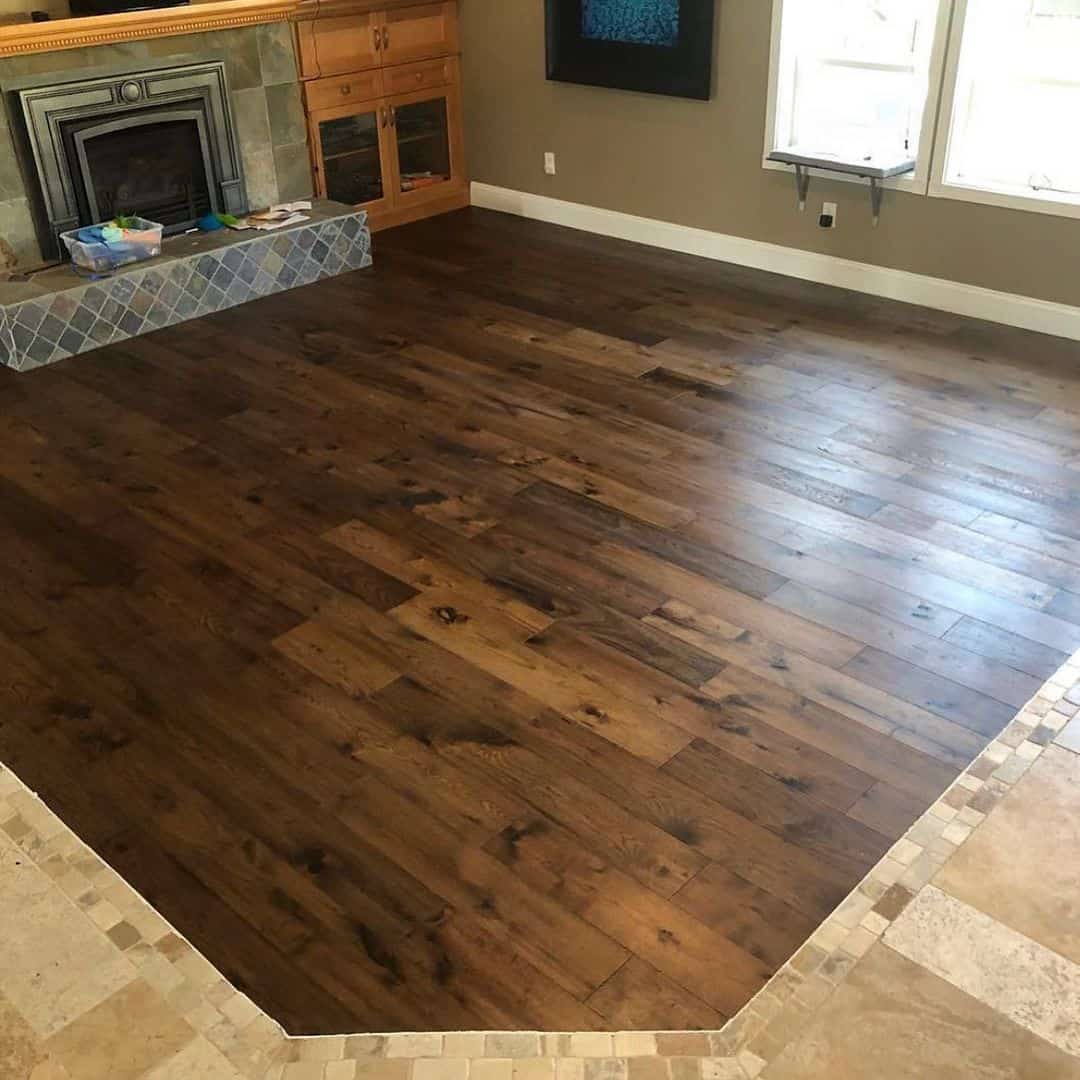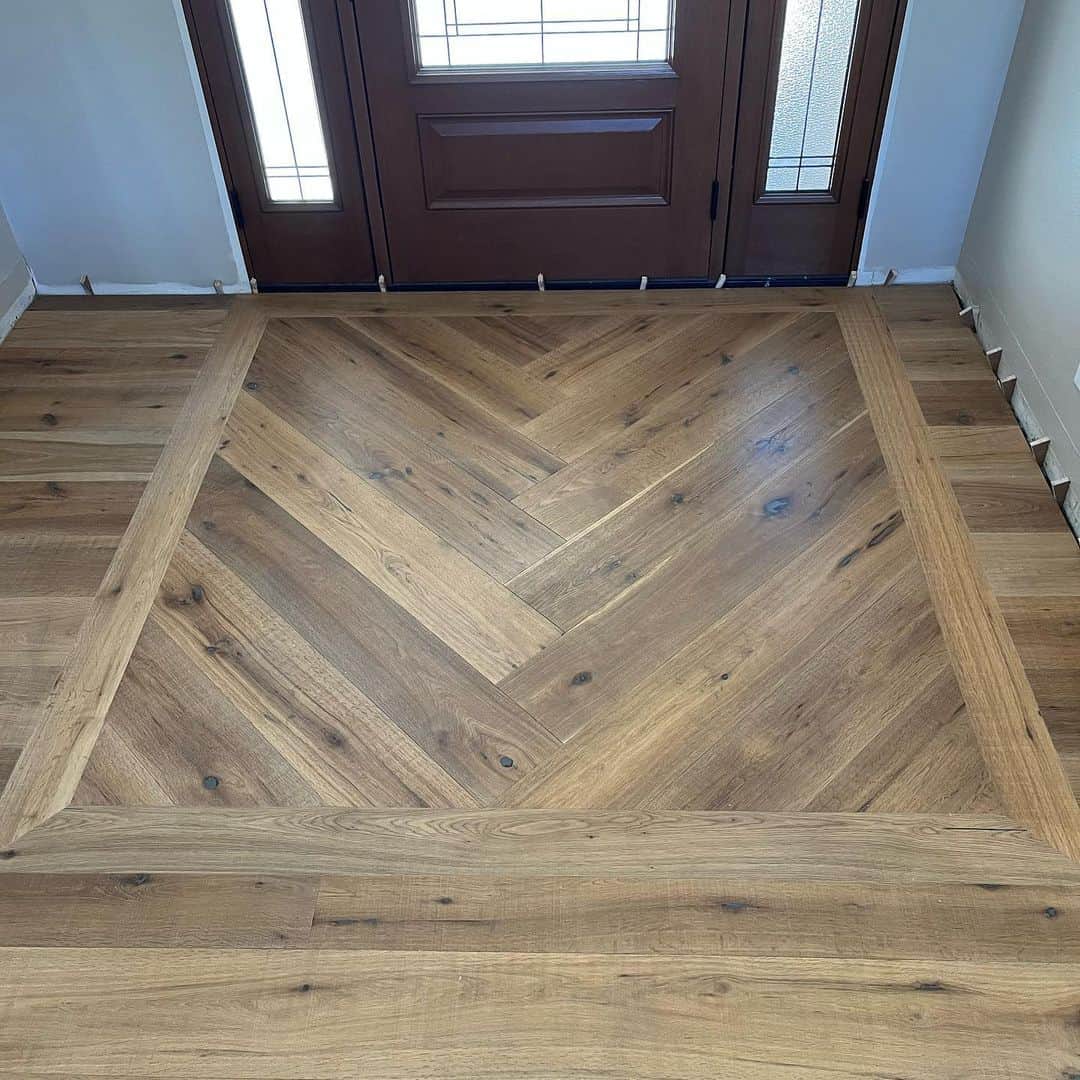You cannot go wrong if you are thinking of enhancing your interior with wooden floors. All types of hardwood floors have an incomparable natural beauty and comfort that you cannot achieve with any other type of floor. But not all of them have the same advantages and disadvantages.
One especially interesting type is engineered hardwood flooring. People wonder many things about it: is engineered hardwood waterproof, what makes it different from hardwood flooring, where it can be used, etc. Continue reading to find out the answers to these and many other questions.
Table of Contents
Is Engineered Hardwood Waterproof?
Difference Between Hardwood And Engineered Hardwood Flooring
If you have ever seen hardwood and engineered hardwood flooring, you may have wondered what the difference is between them because they look very similar. Actually, identical.
Well, in this case, the old “Don’t judge a book by its cover” saying applies definitely because the differences between these two types of flooring are hidden just below the surface.
Hardwood Flooring
Solid wood floors are entirely made of wood and have a considerable thickness, which means they are robust and stable. They are also called natural hardwood flooring because they are produced from types of trees such as red or white oak, ash, beech, pine, and hickory.
Since they are made of raw and thick materials, you can refinish and sand them many times and restore them to their previous glory.
However, solid wood can be susceptible to changes in humidity, which is one of their biggest disadvantages compared to other types of flooring.
Engineered Hardwood Flooring
Engineered or composite wood floors are actually veneers of hardwood connected to several layers of lower-quality wood, like plywood, that are joined together with glue.
Thanks to the thin top layer of solid wood, which is also called the wear layer, they look and feel like hardwood flooring. The combination of the two layers makes them cheaper than hardwood but also gives them excellent stability over time, as they can be used for up to 30 years or so.
But the thin hardwood veneer brings with it some disadvantages. One of them is that, depending on the thickness of the wood veneer, engineered hardwood floors can be refinished only a few times during their lifetime.
Difference Between Waterproof And Water-resistant (Flooring)

Before we answer the million-dollar question, we have to point out the difference between waterproof and water-resistant because even though these two things sound the same, there is an important distinction.
Not understanding or misunderstanding the concepts of waterproofness and water resistance can lead to the inadequate purchase of not only the type of flooring but also clothes, shoes, and electronic devices, so this is a lesson worth learning.
Water Resistance
Water resistance is a material’s ability to resist water penetration to a certain degree but not completely. If something is labeled as water-resistant, it means that its construction or structure makes it difficult for water to enter it.
In some cases, a material or device may be coated with a waterproof substance or layer that would help improve its chances of not getting wet immediately.
Waterproofness
Waterproofness is the ability to completely submerge a thing or material in water without leaking water into it, and it is the highest level of protection against water.
Is Engineered Hardwood Waterproof?
Although certain companies on the market claim to make waterproof engineered hardwood, the fact is that engineered hardwood flooring is not waterproof.
The reason why you may see that claim is that a large number of manufacturers of engineered wood floor seals the top layer with a durable, tough, and waterproof surface coating.
However, you should not forget that there are natural materials such as solid wood and plywood subfloor under it, and we know they are definitely not waterproof.
Due to long-term exposure to moisture, the coating may degrade, which will cause problems for the lower layers, such as the separation of planks or boards, formation of cracks, mold or protrusions, various irregularities in the wood, and wood expansion and contraction.
In extreme cases, it may even happen that the floor starts to separate from the substrate.
All these problems affect the floor and can be dangerous since they increase the risk of accidents and injuries.
Water-resistant Engineered Hardwood Flooring

However, if you are a fan of engineered wood flooring and would like to have a water-resistant floor, we have good news for you. Certain types of engineered hardwood flooring are resistant to water and moisture.
These are primarily high-quality and expensive options, but if you want to have the visual appeal of solid hardwood flooring and not have to worry about problems with moisture, this is the way to go.
Just in case you are wondering, there are also no waterproof hardwood flooring options.
How To Take Care Of Engineered Hardwood Flooring?
The key to beautiful and spotless engineered hardwood floors lies in regular cleaning and proper maintenance. In the next few lines, we will give you some tips on how to maintain it.
1. Do Not Wait Too Long With Liquids
Although this type of floor, as we said earlier, can be resistant to water damage, this does not mean that you do not need to swiftly react to spills caused by, for example, your kids or pets, as water is still the biggest threat to these floors.
So, when an accident happens, immediately take the floor and use a dry cloth to take care of the problematic area.
2. Do Not Use Abrasive Tools
Engineered wood floors are sensitive to scratches, so forget about scrubbing with the rough side of a sponge or a dish wire.
Although these floors can be cleaned with a soft-bristled broom, a vacuum cleaner is your best option. Most models have a special brush for wooden floors, which removes dirt without scratching. But be careful with vacuum cleaner wheels, as they can scratch the flooring without you even noticing.
3. Act Quickly With Stains
No flooring type, except tiles, is on speaking terms with stains. Therefore, if you spill juice or notice a stain on the floor, clean it immediately, so it does not become a bigger problem that will require a more radical solution.
The best cleaning method is a combination of lukewarm water, mild detergent, and soft cloth. Tire, shoe soles, or plastic marks will quickly disappear if you treat them with a little bit of acetone applied to a cotton ball or a dry cloth.
4. Prevention Is Better Than Cure
In order to avoid scratches, stick soft protective pads on the legs of the furniture, especially the ones you move often. Also, avoid using office chairs with wheels or put a rug under them. Lastly, trim your pets’ nails regularly, and avoid walking around the house in shoes, as it is more hygienic and prevents damage to the floor.
FAQ

1. Where Can You Use Engineered Hardwood Flooring?
After all this talk about moisture, waterproofness, and water resistance, you are probably wondering, “Okay, so where can engineered hardwood flooring be actually used?”
If we tell you that it can be used in places such as the kitchen, bedroom, living room, corridors, etc., i.e., anywhere where solid hardwood can be installed, the answer probably will not surprise you, but it will not satisfy you either.
We know what you are really asking with the above question. The answer is yes – engineered hardwood flooring can be used in bathrooms and basements.
Of course, porcelain or ceramic tiles or maybe some kind of waterproof luxury vinyl are better options when it comes to flooring in the bathroom and basement. Still, if you want to get the aesthetics of natural wood in areas where humidity is usually high, you can certainly do it with engineered hardwood flooring.
However, it is important to note that before purchasing this type of flooring, you need to find a sufficiently high-quality manufacturer because, as we said, not all of them have the same level of water resistance.
2. Refinishing Or Waterproof Coating?
If you have carefully read the article until now, you noticed that we said that engineered hardwood floors could be refinished just like solid wood floors, only fewer times. But this only applies to floors that have not been waterproofed with surface sealer.
In case you want to refinish such a floor, you will also have sand off the coating, which would make it less water-resistant.
Have this on your not only when choosing between the different types of flooring but also different types of engineered hardwood flooring.
Conclusion
We are sorry if we disappointed you by telling you that engineered hardwood is not waterproof. But you probably did not plan to install it on the bottom of the pool or the shower cabin. At least, we hope you did not.
There is no need to despair because you have water-resistant engineered hardwood, which is the next best thing. And you can use it all over your home.
Good luck with that, and let us know how it went in the comments. Or ask something regarding this topic!